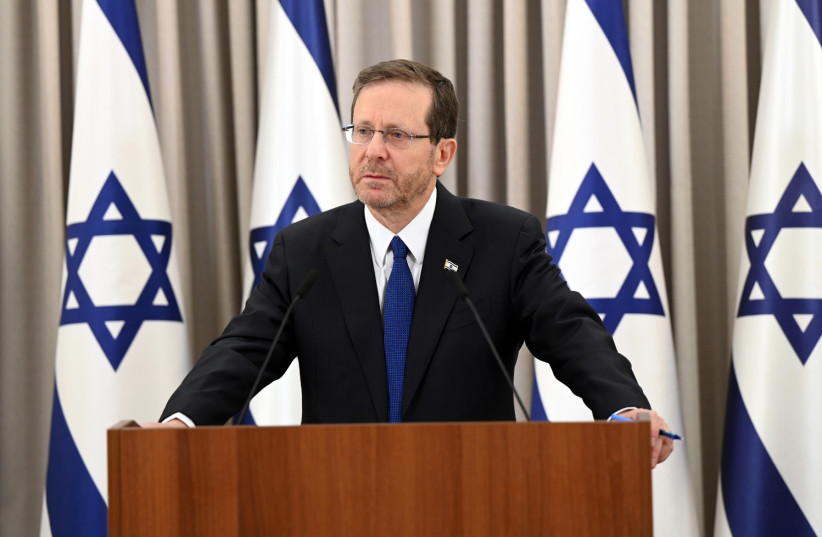Israel has taken great steps toward compromise on the theoretical framework of judicial reform in recent days, such as the statement by leading reform proponent Kohelet Forum on compromise, negotiation outlines like the Friedmann plan rising to the forefront of discourse, and President Isaac Herzog’s compromise announcement. But once negotiation actually begins, the issue of the judge selection committee may be an obstacle to a final agreement.
While hawkish contingents within both the coalition and opposition have been distractingly vocal in advocating toward achieving politicized decisive victories – unilateral reform or complete cancellation – the divisions between the camps on the actual policy points are fading.
Politicians and activists are increasingly coming to accept the notion of compromise on a great deal of issues.
On whether there needs to be reform, as Constitution, Law and Justice Committee chairman Simcha Rothman once told The Jerusalem Post, most have come to accept a need for reform – the debate is about the formula. This is evident on the opposition side when leading legal experts, the Movement for Quality Government in Israel (MQG) and Yesh Atid leader Yair Lapid offered reform outlines last week in which they acknowledge the legal system has gaps that need to be filled.
Theoretical compromise is emerging
When it comes to the actual content of reform, a great deal of theoretical compromise is emerging. Kohelet, one of the major driving forces behind reform policy, said on Wednesday that it was able to bridge the gaps on almost every provision of the judicial reform plan.

Rothman (Religious Zionist Party) Justice Minister Yariv Levin (Likud) have positively viewed the Friedmann plan, which as drafter Prof. Yuval Elbashan noted, demands a great deal of compromise from both sides. While the opposition’s initial response was rejection of the outline, it has already gained repute in the discourse rather than fading away.
Law Prof. Alan Dershowitz estimated in a discussion with Kohelet’s Eugene Kontorovich on the Australian J-Air Radio channel that if the two of them sat down for a few hours they could come to an agreement on 80% of the issues.
While the main judicial reform provision cited to the writer by most demonstrators during protests as their chief concern was the override clause, in theoretical policy discussions it has become a non-issue.
Kohelet has said that it would be willing to drop the override clause if the problems it was designed to solve were addressed by alternative means. MQG head Dr. Eliad Shraga had previously described the override as negligible compared to other provisions. Dershowitz has repeatedly described it as something that can be acceptable with alteration of voting numbers and limited application to human rights.
Other legal experts have deemphasized the override, while placing a great deal of importance on the judicial selection committee, with Kohelet writing on Monday it was an essential item that had to be addressed in a reform plan. Anti-reformists told the Post that it is an issue that cannot be compromised upon, and would result in a control of the judiciary by the coalition if the current plan was implemented.
In their discussion on J-Air, the judge selection committee became the main provision of Dershowitz and Kontorovich’s disagreements.
While Dershowitz believed that the two could compromise on much in the reform discussions, “We’re never going to reach full agreement on the issue of judge selection where we have fundamental disagreements.”
Dershowitz felt that to be an effective check to government abuse of human rights and majoritarian excess, it needed majoritarian-minded professionals in a rigid structure dedicated to protecting those rights. Kontorovich felt that the courts were too homogeneous in policy opinions, were detached from the situation of the citizenry and had too many powers and protections, causing them to issue unchallengeable, biased rulings that didn’t adequately protect citizens or their rights.
What are the three proposals for the judge selection committee?
There are currently three main proposals for the judge selection committee. The status quo proposal calls to keep the current system in which the panel is made up of the High Court president and two other judges, two Knesset members, two Bar Association members, the justice minister and another cabinet member. Reformists argue that this framework creates an automatic bloc of the judges and Bar representatives, who have an interest to work together to select judges. This bloc, they contend, is unelected and therefore doesn’t answer to the public.
The second proposal is the Rothman plan, which would replace the Bar Association members with another cabinet minister and the Law Committee chairman. The judge representatives would have to be retired and chosen in agreement between the justice minister and High Court president. While the plan would codify the inclusion of a coalition MK, anti-reformists argue that this would create an automatic coalition majority to select judges.
The third proposal being discussed is the Friedmann plan, which would have a panel of 12, four members each from the coalition, opposition and judges. The judges would largely have an observatory and advisory function, though the High Court president would have the same once-a-term veto power that the justice minister would possess. When selecting judges, the coalition and opposition would promote one each time.
The question is whether any of these or any future proposals can address the fundamental disagreement over more representative democracy or over liberal democratic checks and balances in the judicial system.
While the judge selection committee is shaping up to be the next great obstacle in a final agreement, it can only be addressed if both sides come to the table and get past the precondition phase.
“Extremists on both sides are winning,” said Dershowitz on J-Air: “That’s why there won’t be a compromise.”
